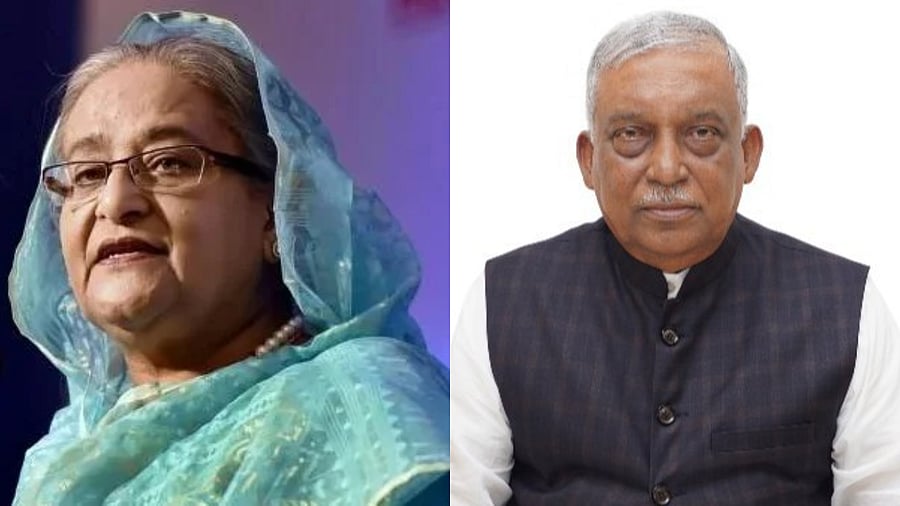
Prime Minister Sheikh Hasina and former interior minister Asaduzzaman Khan Kamal.
Credit: PTI photo, X/@kamal_dhaka12
New Delhi: Even as Sheikh Hasina dismissed the death sentence awarded to her by a court in Dhaka on Monday as “biased and politically motivated”, Dhaka has cited the verdict to mount pressure on New Delhi for the extradition of the deposed prime minister of Bangladesh from India.
The interim government headed by economist Muhammad Yunus in Dhaka stated that if any foreign nation provided shelter to Sheikh Hasina and Asaduzzaman Khan Kamal, the interior minister of the erstwhile Awami League government, after they were convicted and sentenced for “crimes against humanity”, it would be tantamount to an “unfriendly gesture” to Bangladesh.
“We will request India to immediately hand over the two fugitives to the authorities of Bangladesh, fulfilling the obligations under the bilateral extradition treaty,” the Ministry of Foreign Affairs of the interim government in Dhaka stated, sending out a message to New Delhi.
New Delhi has been cautious in its reaction after the International Crime Tribunal (Bangladesh) sentenced Sheikh Hasina and Asaduzzaman Khan Kamal in absentia to death for the “crimes against humanity” committed during the police crackdown on the students and youths, who had protested against reservation in government jobs in July-August 2024.
“As a close neighbour, India remains committed to the best interests of the people of Bangladesh, including in peace, democracy, inclusion and stability in that country,” the Ministry of External Affairs in New Delhi stated, adding that it had taken note of the verdicts of the ICT (Bangladesh).
“We will always engage constructively with all stakeholders to that end,” Randhir Jaiswal, the spokesperson of the Ministry of External Affairs, stated, avoiding any comment on Dhaka’s request to New Delhi for the extradition of Sheikh Hasina and Asaduzzaman Kamal.
A source in New Delhi, however, stressed that Prime Minister Narendra Modi’s government was unlikely to yield to the pressure from Muhammad Yunus’s interim government in Dhaka to extradite Sheikh Hasina to Bangladesh, where her life might be in peril.
“The verdict announced against me by a rigged tribunal, established and presided over by an unelected government with no democratic mandate, is biased and politically motivated,” Hasina said in a statement issued from an undisclosed location in India.
She alleged that the Islamic extremists within Muhammad Yunus’s interim government were trying to undermine the secular and progressive traditions of Bangladesh, with assaults on the Hindus and other minority communities, suppression of the rights of women, and curbs on freedom of the media.
The issue of the pending extradition of Hasina from India to Bangladesh may come up again during the meeting between National Security Advisor Ajit Doval and Khalilur Rahman, his counterpart in the interim government of the neighbouring country, in New Delhi this week.
Doval has invited Rahman to attend the meeting of the Colombo Security Conclave – a regional bloc for maritime security cooperation, comprising India, Mauritius, Sri Lanka, Bangladesh and the Maldives. Doval and Rahman are likely to hold bilateral talks on the sidelines of the CSC meeting in New Delhi on Wednesday.
Rahman is going to be the first senior official of the interim government of Bangladesh to visit India. No other senior official from Bangladesh visited India after Hasina’s Awami League government collapsed in the wake of a mass uprising against the crackdown on the agitating students and youths, and she had to fly from Dhaka by a military aircraft to an Indian Air Force base near New Delhi on August 5, 2024.
Foreign Secretary Vikram Misri, however, visited Dhaka in December 2024. External Affairs Minister S Jaishankar had meetings with his counterpart in the interim government in Dhaka, Md Touhid Hossain, in New York and Muscat.
Dhaka had on December 23, 2024, formally asked for the extradition of Sheikh Hasina from India to stand trial in Bangladesh. New Delhi, however, maintained silence on the request from Dhaka in the last 11 months, and the judicial proceedings against her and her aides at the ICT (Bangladesh) went on in the absence of the accused.
A source in New Delhi told DH that India had no obligation to extradite Hasina and Kamal to Bangladesh. He cited the 2013 extradition treaty between the two nations and pointed out that Article VI of the treaty had a clause that provided that extradition requests could be turned down if the alleged offence of the accused or the convicted person was found to be political in nature.
Rahman is likely to convey to Doval during the meeting in New Delhi the concerns of Bangladesh over the political statements being made by the deposed prime minister from India.
Doval, on the other hand, is expected to convey New Delhi’s concerns over the growing bonhomie and military-to-military contacts between Bangladesh and Pakistan.
